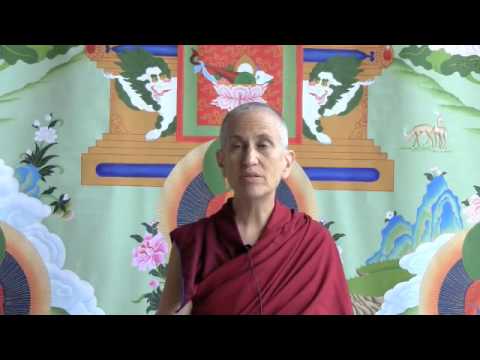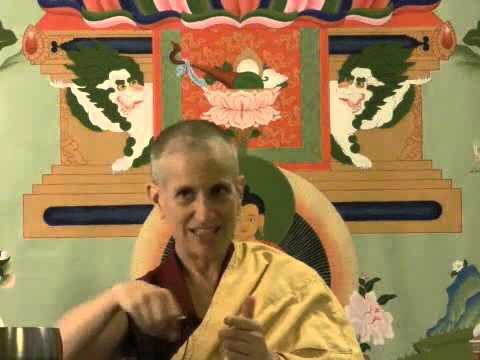Verbal pathways of virtue
Stages of the Path #74: Karma, Part 11
Part of a series of Bodhisattva's Breakfast Corner talks on the Stages of the Path (or lamrim) as described in the Guru Puja text by Panchen Lama I Lobsang Chokyi Gyaltsen.
- Refraining from the nonvirtues of speech
- Practicing the opposite of the verbal nonvirtues
- Learning to communicate in a kind way towards everyone around us
We’ve been talking about the ten virtuous actions. We talked about protecting life and protecting others’ property, being generous. Using sexuality wisely and kindly. Being truthful. And using our speech to create harmony.
The next one is the opposite of harsh words. This is speaking kindly to others. This could involve pointing out people’s good qualities to them. This is actually a very good practice to get used to. With harsh words we point out people’s bad qualities. We’re very proficient at that. Whether or not they have those qualities, we don’t care, we point them out. But it’s very useful for us to really look at people’s good qualities and point those out, and praise people. And when people do things that we appreciate, again, to point that out. And be specific.
I think especially with children, this is important, because sometimes with kids we just say, “Oh, you’re a good boy or a good girl,” and the kid has no idea what they did that the mommy and daddy like. But if you say, “Oh, you cleaned up your room today and it’s so nice for me to look at it now,” then the child knows. Similarly with adults, I think it’s very good if we can point out something somebody did well and acknowledge that. Or point out some quality, some habit they have, that you think is really good. Making it a regular daily practice. Homework assignment: To say something kind to somebody every day, in terms of praising them. Not so that they’ll like you, not with that kind of motivation, because that’s kind of a rotten motivation, but really because it’s our own practice to see goodness in others.
Speaking kindly to them in general. And I think here, using manners is very important. I realize that so much of our friction with other people is because we forget basic human manners, and we just start expecting people to be our servants almost. Instead of saying “please” or “thank you” or “could you please,” we say, “Do this.” Just being sensitive to other people, and being polite, can really improve the quality of our relationships. You probably noticed, small things like this can be huge stuff.
Learning to communicate in a kind way, in a pleasing way, but for the right motivation. It’s not people-pleasing. People-pleasing is “I’m doing this so that you owe me one.” It’s not trying to get people to like us. It’s done out of a mind that genuinely cares.
And to also be this way towards strangers, not just towards the people whom we know. It’s easier towards the people we know. Sometimes. When they do what we like. When they don’t do what we like they become our objects of harsh words. But also with strangers. When we’re dealing with people on the phone or at an airport, or in a store, to be courteous to them, to look them in the eye, to help them feel like human beings. If there’s somebody on the street who needs food, and you’re giving food, look the person in the eye, make the offering with both hands. Something in which we are speaking kindly to others.
Venerable Thubten Chodron
Venerable Chodron emphasizes the practical application of Buddha’s teachings in our daily lives and is especially skilled at explaining them in ways easily understood and practiced by Westerners. She is well known for her warm, humorous, and lucid teachings. She was ordained as a Buddhist nun in 1977 by Kyabje Ling Rinpoche in Dharamsala, India, and in 1986 she received bhikshuni (full) ordination in Taiwan. Read her full bio.


